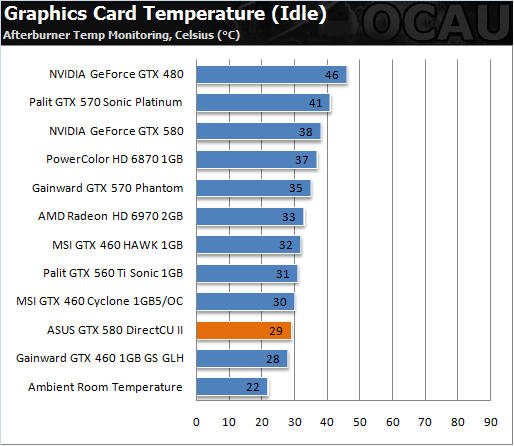|
|
|
|
|
ASUS GeForce GTX 580 DirectCU II |
|
Join the community - in the OCAU Forums!
|
Synthetic Benchmarks, Heat & Noise, Conclusions
Synthetic Benchmarks:
Benchmark: 3DMark Vantage and 3DMark 11
Score: GPU/Graphics Score Only - Higher is Better.
Download Link: here.


Benchmark: Unigine Heaven Benchmark 2.1
Score: Average Frames per Second (FPS) - Higher is Better.
Download Link: here.


Noise and Temperature Results:
Noise measurements were taken with a digital sound meter approximately 3cm away from the video card fan, reducing the ability of other components such as the CPU or PSU fans to interfere with the final results. Software used for stressing was 3D Mark Vantage, looped until the sound level was stable and stopped rising.


Temperature readings were taken at an ambient temperature of approximately 22 degrees Celsius, on a open test bench with the fan set to auto. Load and idle temperatures were monitored by MSI's Afterburner utility. Software used for stressing was 3D Mark Vantage, looped until the temperature was stable and stopped rising.


Conclusions:
We were delighted to see what ASUS's engineers where able to accomplish with their GTX 580. The card offers a near limitless amount of potential thanks to its a 8-phase power and upgraded electrical components, and in the right hands (and a bit of LN2 and volt modding as shown recently by Shamino), a scorching core clock of over 1500 MHz is achievable. Unfortunately for the non-extreme user ASUS seem to have limited the voltage adjustment to what a reference design may have (for safety), pushing enthusiasts to either volt mod their cards or look at BIOS modification to up the maximum voltage available (at their own risk). While this may change in the future with new software, we were still able to reach a impressive 980 MHz core clock and a 1180 MHz (4720 MHz effective) overclock with this limitation.
In summary, ASUS offers a solid improvement on the already well designed GTX 580 from power delivery to cooling performance. If you can manage the triple slot design then you'll be rewarded by a highly overclockable video card with plenty of cooling performance and even better acoustics than a reference GTX 580.

Feel free to comment on this review in this thread.
|
|
Advertisement:
All original content copyright James Rolfe.
All rights reserved. No reproduction allowed without written permission.
Interested in advertising on OCAU? Contact us for info.
|

|


